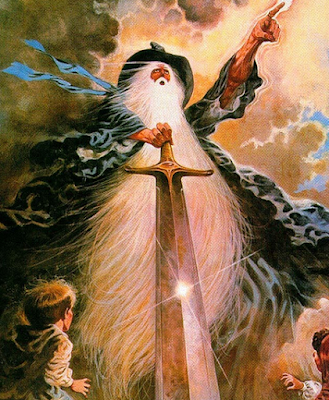...[C.S.] Lewis was virulently anti-Nazi and anti-communist, and, like Tolkien, he also knew that democracy has its own risks. The West has bred all three political/economic systems. As an ideology, man-made and man-centered, bureaucratic democracy may appear as a brightly-colored package, more pleasing to the eye than the grittiness of socialism, but it too desires to make man a means to an end, to make him a mere cog in a machine...
Tolkien has proven to be one of the best selling authors of all time, selling the greatest number of his works in the very same century that he so much despised. Something in Tolkien’s world clearly resonated with many in the modern world. Dissidents of a sort.
As one might imagine, the literati have not been pleased. “Tolkien–that’s for children, isn’t it? Or the adult slow,” wrote one British critic. “It just shows the folly of these polls, the folly of teaching people to read.” English reviewer Andrew Rissik dismisses Tolkien’s relevance:
After the annihilating traumas of the last century, it’s merely perverse to ascribe greatness to this airy but strangely simplified mock-Teutonic never-never land, where races and species intermingle at will and great battles are fought but there is never any remotely convincing treatment of those fundamental human concerns through which all societies ultimately define themselves–religion, philosophy, politics and the conduct of sexual relationships.Feminist critic Germaine Greer contends that Tolkien’s works dismiss the “great struggles of the twentieth century”–such as “politics, war, the black movement, and [the] sexual revolution.”
The British are not alone in their criticism. Famed American literature professor Harold Bloom contends that the Lord of the Rings is simply a period piece that “met a need in the early days of the Counter-Culture.” That is, Tolkien’s Middle-earth provided one of the many escapist fads for the hippies of the 1960s and early 1970s. They desired escape by any means necessary: drugs, music, or Tolkien. Further, Bloom contends, the protagonist of the story, Frodo, is not a hero, and his sage companion, Gandalf, is “self-important” and rude
And, yet, Tolkien and the Inklings were doing exactly what their critics claimed they weren’t: They were attempting to confront the monstrosities of the twentieth century through the vehicle of myth, a vehicle that allows one to see reality from a new perspective—perhaps a higher reality that goes beyond mere facts, at least at the pragmatists defined them...
h/t Andrew Klaven


No comments:
Post a Comment